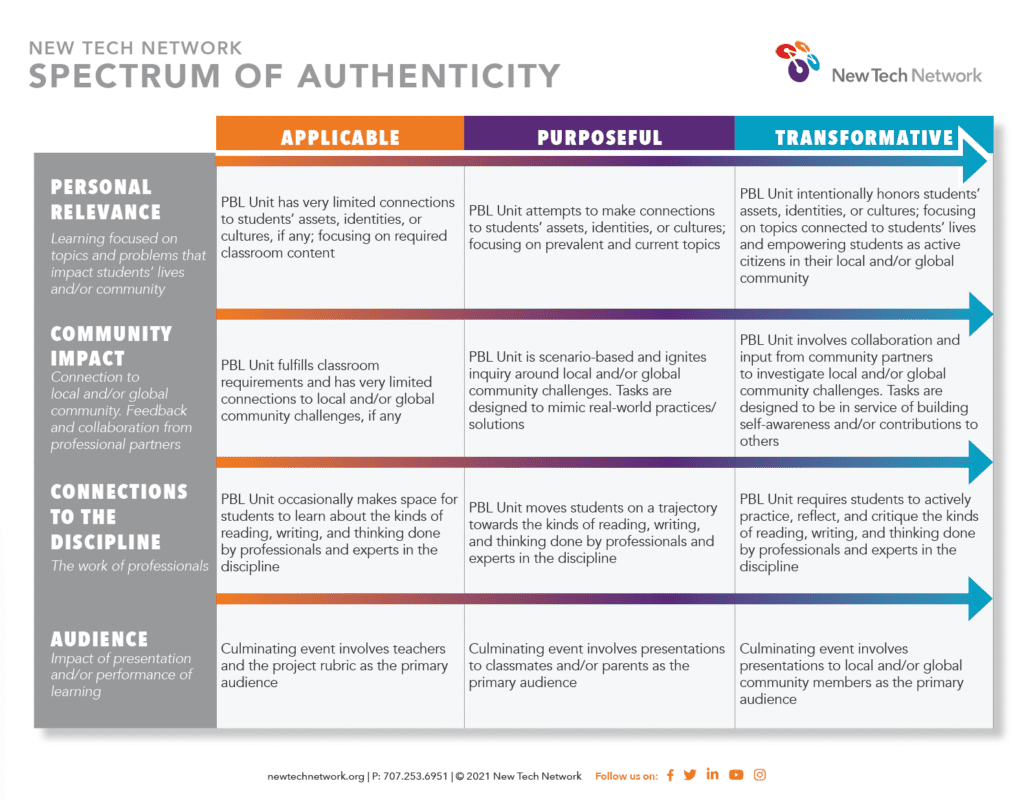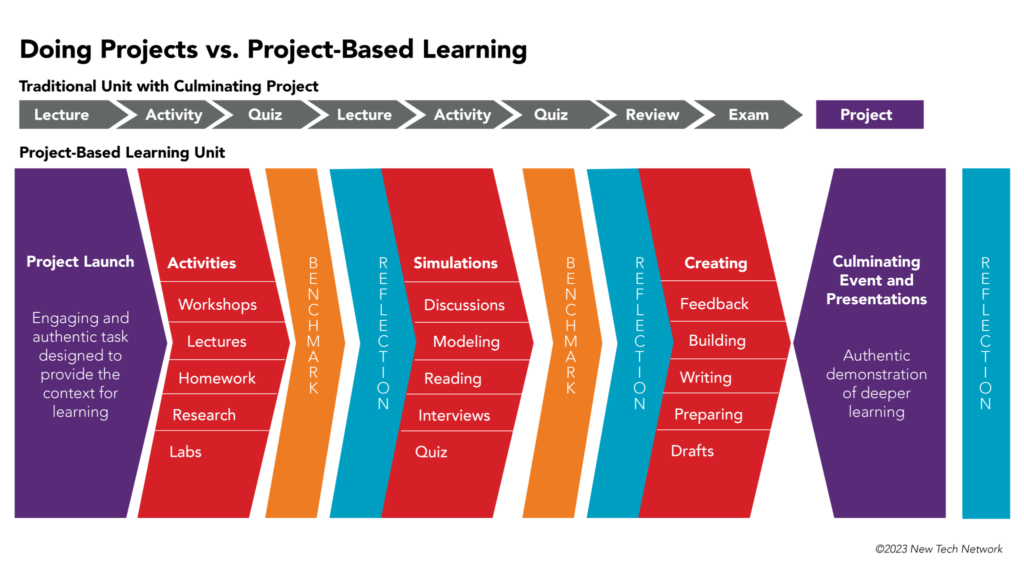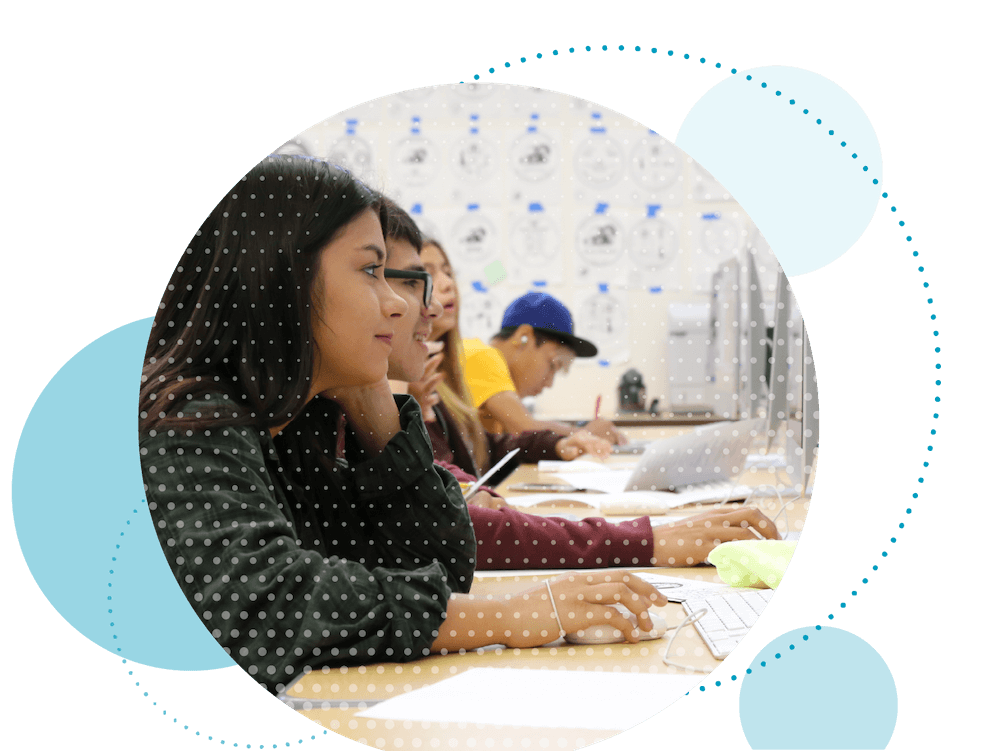Our Network
District Profile
Lancaster County, Pennsylvania
Using Community Partners and PBL to Connect Students with Real-World Experiences
In Lancaster County, Pennsylvania, 16 public school districts have come together to collaborate to provide students with real-world learning experiences. Supported by the Lancaster STEM Alliance and a local education service agency, Lancaster-Lebanon Intermediate Unit 13 (IU13), the districts are working with New Tech Network to grow a county-wide project-based learning (PBL) network that directly serves teachers and builds educator capacity to scale the work.
In 2023, Lancaster STEM Alliance and IU13 launched an “Adopt-a-Middle School” program focused on matching local businesses with classroom teachers. The aim is to become a hub for STEM literacy and experiential learning while improving student engagement, a specific post-pandemic concern. Following the program’s launch, it was immediately clear that there was high demand from teachers and school leaders for this style of teaching and learning. The IU13 looked for ways to increase the program’s capacity and to create classroom-based real-world learning experiences through project-based learning. Leveraging New Tech Network’s expertise in implementing and scaling PBL learning environments, IU13 and NTN designed a three year program to support Lancaster County educators in scaling deeper learning environments across their districts.
Brian Booker, Teaching and Learning Consultant for IU 13 says, “Teachers are in the classroom all the time and they may teach a certain content or skill but don’t have the experience in the real world to see how that skill is applicable elsewhere. We matched local businesses with local middle schools to see how the content or topic is replicated in the real world. Through PBL training and collaboration with these business leaders, teachers are then better equipped to respond to students’ questions like Why are we learning this? Why are we doing this?” Teachers now come together from across the county to experience community partnerships and learn from NTN’s expertise in creating authentic classroom learning experiences.
Why do community partners matter?
Community partners are essential for great PBL because they bring a level of expertise about their business or organization that classroom teachers cannot replicate. By connecting students with experts and resources from their community, students have the chance to gain meaningful knowledge and skills that are relevant beyond the classroom.
When what is being learned is personally relevant, students connect to why they are doing certain tasks, which in turn, contributes to improved student learning outcomes. To consistently create these kinds of learning experiences requires developing and sparking curiosities and providing authentic and meaningful learning opportunities. According to Kristin Reynolds, 8th grade Language Arts teacher, working with their business partners as they design projects leads to high levels of relevance. “To have the opportunity to partner with someone in a business doing what these students may want to do makes them feel more connected to the actual point of a project. It automatically answers ‘Why are we doing this?’.” When measured on NTN’s Spectrum of Authenticity, what Lancaster Schools and STEM Alliance are aiming to do, builds transformative experiences for students.

A key advantage of the close connections between businesses and classroom experiences is that it allows teachers to lean into their expertise while allowing their business partners to support project units with their deep contextual knowledge. Dawn Butt, an instructional coach working closely with teachers states, “Through a community partner and connection, teachers get to be experts in their content areas and the partners fill in the blanks.“ Teachers across these districts have been planning and designing projects in all content areas. Here are a few examples of pairings or projects planned for this school year:
- A technology teacher matched with a bank to do a Shark Tank style project
- An English Language Arts teachers paired with a metal recycling plant to highlight skill-based professional writing
- A science teacher is working with a solar power company
Connor Daniels and Kristin Reynolds, an 8th Grade Social Studies and ELA team, are exploring possibilities with a local radio station in Harrisburg, PA. Kristin shared the early thinking of a project idea. “We are in the middle of designing our first project ever. We met with them today which fleshed out the reality of creating a project like this and the daunting task of actually doing it as a job. Our goal is to get everyone to create a long-form and a short-form of social media.” Their students will create a podcast episode about a social issue that they found during the Reconstruction Era. They will also create a short-form, Instagram or TikTok reel, that promotes their long-form content. This is the marketing model that the radio station regularly uses to promote interviews with musicians.”

Teachers keep their business partner’s connections in mind as they utilize NTN tools and resources to design projects. Connor Daniels, 8th grade Social Studies teacher shared, “This year the resources that we have received from NTN have allowed us to make a really strong high quality project. That is my biggest takeaway. Coming up with a project can be daunting but the resources we have received are plug and play which helps it all come together and that has been extremely helpful.”
A second cohort of teachers is working with NTN to focus on implementing NTN Practices Cards for the classroom as a way to deepen PBL instructional practices. Specific NTN Practices Cards, such as Bookend Lessons and Socratic Seminars, are activities teachers can incorporate so that they design more learner-centered approaches that prepare students to develop 21st century skills, necessary for both career and college paths. “There are so many forms of communication that are relevant and authentic to what they will see in their future. The tools we have, Practices Cards, are such simple ways to get students to communicate, collaborate, and move in a classroom setting like they will in their future. Rather than just sitting and writing or taking a test, it shows them that it is more and more about collaboration and teamwork”, states Kristin Reynolds, 8th grade LA teacher.
While teachers learn, design and implement, NTN is also supporting district leaders, including instructional coaches, with training focused on how to create systems to sustain PBL across schools. Each leadership cohort spends time learning alongside teachers and then comes together to self-assess where they are in their instructional practices, develop and share the vision for the work in their school, and explore how they might provide better support and feedback to teachers. Leaders then convene virtually throughout the year to share best practices across the county and learn more about how other schools have successfully scaled this work to apply to their own context.
Looking to the Future
As Lancaster County and Lancaster-Lebanon Intermediate Unit 13 (IU13) look to help shape this type of teaching and learning, the question is: “How can we work together across the county to build the capacity of our schools to scale this vision?” This Summer, IU-13 coaching staff will continue training with NTN to design a local PBL orientation workshop for future teacher cohorts. NTN and local instructional coaches will continue to support teachers and their businesses with project planning and implementation.
Deni Weaver, an instructional coach at Ephrata Area School District shared, “We are asking teachers to make some major changes in the process and that takes a lot of work and they need to see the payoff. My goal is to increase student achievement through engagement. What does that look like for teachers? The teachers who are doing the work are the ones who are championing the work. We are hoping for a ripple effect.“
NTN’s national expertise in PBL and leadership support combined with IU13’s on-the-ground connections to their communities along with classroom coaching are working to create more relevant and compelling experiences for all Lancaster County students.


